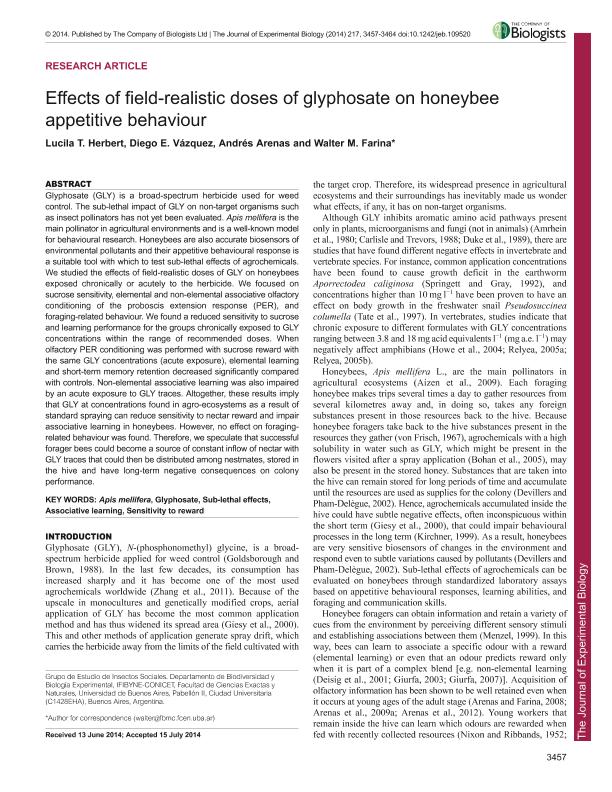Artículo
Effects of field-realistic doses of glyphosate on honeybee appetitive behaviour
Fecha de publicación:
10/2014
Editorial:
Company of Biologists
Revista:
Journal of Experimental Biology
ISSN:
0022-0949
Idioma:
Inglés
Tipo de recurso:
Artículo publicado
Clasificación temática:
Resumen
Glyphosate (GLY) is a broad-spectrum herbicide used for weed control. The sub-lethal impact of GLY on non-target organisms such as insect pollinators has not yet been evaluated. Apis mellifera is the main pollinator in agricultural environments and is a well-known model for behavioural research. Honeybees are also accurate biosensors of environmental pollutants and their appetitive behavioural response is a suitable tool with which to test sub-lethal effects of agrochemicals. We studied the effects of field-realistic doses of GLY on honeybees exposed chronically or acutely to the herbicide. We focused on sucrose sensitivity, elemental and non-elemental associative olfactory conditioning of the proboscis extension response (PER), and foraging-related behaviour. We found a reduced sensitivity to sucrose and learning performance for the groups chronically exposed to GLY concentrations within the range of recommended doses. When olfactory PER conditioning was performed with sucrose reward with the same GLY concentrations (acute exposure), elemental learning and short-term memory retention decreased significantly compared with controls. Non-elemental associative learning was also impaired by an acute exposure to GLY traces. Altogether, these results imply that GLY at concentrations found in agro-ecosystems as a result of standard spraying can reduce sensitivity to nectar reward and impair associative learning in honeybees. However, no effect on foraging-related behaviour was found. Therefore, we speculate that successful forager bees could become a source of constant inflow of nectar with GLY traces that could then be distributed among nestmates, stored in the hive and have long-term negative consequences on colony performance.
Palabras clave:
Apis Mellifera
,
Glyphosate
,
Sub-Lethals Effects
,
Associative Learning
Archivos asociados
Licencia
Identificadores
Colecciones
Articulos(IFIBYNE)
Articulos de INST.DE FISIOL., BIOL.MOLECULAR Y NEUROCIENCIAS
Articulos de INST.DE FISIOL., BIOL.MOLECULAR Y NEUROCIENCIAS
Citación
Arenas, Andres; Vázquez, Diego Eduardo; Herbert, Lucila Thomsett; Farina, Walter Marcelo; Effects of field-realistic doses of glyphosate on honeybee appetitive behaviour; Company of Biologists; Journal of Experimental Biology; 217; 10-2014; 3457-3464
Compartir
Altmétricas




